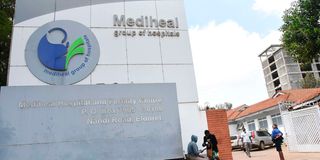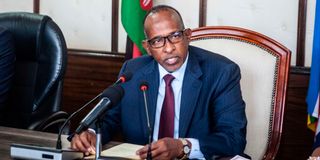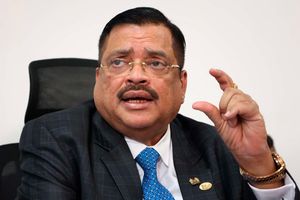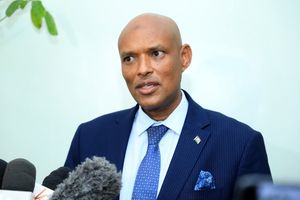
The entrance to Mediheal Hospital and Fertility Centre in Eldoret town, Uasin Gishu County on June 20, 2022.
A legal loophole on organ donation, alleged manipulation of medical records and vulnerable donors aided suspicious kidney transplants at Mediheal now being investigated by the government.
Dr Darwin Ambuka, a medical law expert and the deputy vice chair at the Kenya Medical Practitioners Pharmacist & Dentist Union (KMPDU) North Rift branch, said the circumstances under which consent forms were signed by donors are questionable.
This is after scrutiny of 80 pages of internal medical records, forms and affidavits which Mediheal made kidney donors and recipients sign.
The law in Kenya provides for living-related and directed transplants.
However, the affidavits obtained by Nation, for example, show that the person denotes a relation between them and their donor and vice versa, although the relationship wasn’t verifiable.
That was greatly exploited as there wasn’t a national body or ethical committee that vetted their transplant applications.

Mediheal Hospital and Fertility Centre in Eldoret town, Uasin Gishu County.
In an interview with Nation on Saturday after going through the official records, Dr Ambuka highlighted that in most of the affidavits, Mediheal had made at least 372 Kenyans fugitives in their own country before taking away their kidneys.
“If you look at those official forms Mediheal generated and has been using, ‘organ donors’ seem to have become fugitives in their own country after they were made to adopt Somali names.
“A fugitive cannot sign a form that is legally binding, their families are not even aware they are donating organs yet we all know that in organ donation, consent extends to family,” he pointed out.
“They misused those forms as an escapist tool which is illegal,” Dr Ambuka highlighted.

Health Cabinet Secretary Aden Duale addresses journalists at Afya house, Nairobi, on April 17, 2025.
This comes after Health Cabinet Secretary Aden Duale last week ordered the immediate suspension of all kidney transplant services at Mediheal until further notice.
The CS cited serious allegations of malpractice and ethical violations related to transplant procedures at the health facility based in Eldoret.
But how exactly has suspected organ trafficking been thriving under the nose of the government?
First of all, there is an immense lack of political goodwill to nip the vice in the bud.
In the last five years, inspections have been conducted, reports developed but the recommendations have never been implemented.
Dr Ambuka points out that a bigger reason is that Kenya does not have a clear law that dictates how to transact body organs. It is this lacuna in law that rogue medical agencies are exploiting.
“In this country, we import corneas from India yet we don’t know the circumstances of obtaining these corneas because we don’t have a regulatory framework. Parliament has never addressed this issue and whenever a problem arises, they only do firefighting,” he said.
“Eldoret is a health hub that has sub-specialities and specialities due to the fact that it has many poor patients. Eldoret has also been in the news for doping by athletes and other money-making schemes,” he added.
He said KMPDU had learnt of people descending on villages in the area to hunt for organ donors.
The Health Act 2017, according to experts, gives broad strokes in terms of organ transplantation.
Section 80 part 1 guides on authorisation of transplants; 80 (2) clearly states that the parties responsible for the authorisation should not be directly involved in the transplantation- pre, peri and post.
Section 80 (3) requires the health CS to set up national regulations for approval of transplant facilities while 80 (4) bars transactional transplants.
Section 81 talks of consent implicitly given by the donor in their will. In the absence of a will, the power lies first with the kin, then the government.
Section 82 instructs on what the donation can be used for. Transplantation is covered in this section.
Section 83 gives power to the donor to revoke their consent at any point while Section 85 establishes a body named the Kenya Blood Transfusion and Transplant Services (KBTTS) with the mandate of establishing a national service; and regulating and superintending blood transfusion services in the country.
So, what exactly are the gaps currently being taken advantage of by unscrupulous medics who are part of a larger organ trafficking global network?
First, the health ministry since 2017 has never established regulations as stipulated in the Act.
The regulations listed do not adequately protect the process of transplantation as they only place importance on the facilities licensed to perform transplants.
Regulations superintend/provide oversight; establish national guidelines and standard operating procedures (SOPs) based on global best practice. There is nobody legislated for this undertaking.
There isn’t a provision in law, to even establish the said body.
The establishment of a transplantation facility as presently provided by law is disjointed.
There are a myriad of regulatory bodies responsible for licensing various procedures within transplantation that don’t work in tandem.
“Observing global best practice, matters affidavits, consent forms, transplant charges, should all be governed by the law and should be nationally recognised and regulated due to the sensitivity of the matter,” said Dr Ambuka.
Experts say for a transplant facility to be registered, the transplant surgeons must be licensed and registered to practice permanently within the country.
This is part of the global best practices although while it’s allowable in a country like Kenya to have foreign doctors come in due to skill shortage, Mediheal should have a resident transplant physician within the facility.

Mediheal Hospital Chairperson Dr Swarup Mishra. He has said the hospital does not engage in organ trafficking.
The hospital did not because the legal framework does not provide for this.
In an interview with Nation last week, Dr Swarup Mishra, the chair of Mediheal, defended the hospital, saying it does not deal in any organ trafficking.
"We at Mediheal have not done any selection of any donor and have not paid them for a kidney," Dr Mishra told Nation.
"Nothing of these things they are saying happened at Mediheal. We are waiting for the government to develop a legal framework that will aid us do proper donor selection and the health ministry is currently working on it,” Dr Mishra said.
"Foreign recipients come here after being given Visas by their government and permits by the Kenyan government, it has nothing to do with Dr Mishra,” he added.











